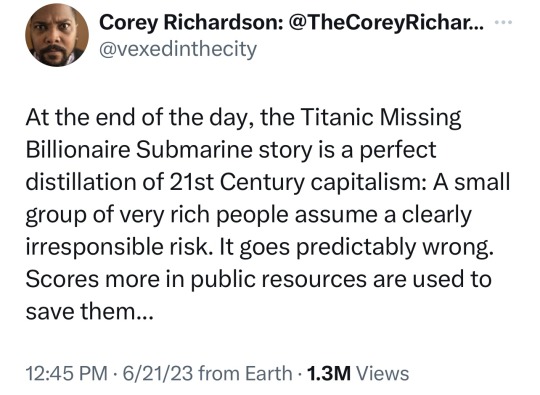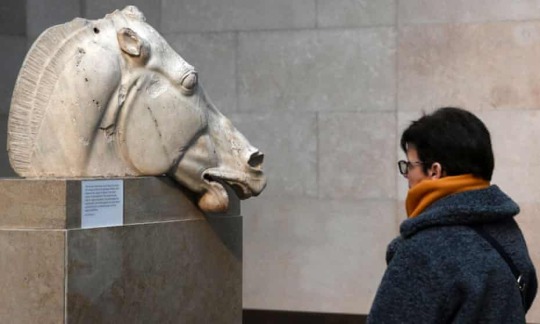#taxpayer in Greece
Text
#real estate#taxpayer in Greece#property transactions in Greece#tax advisor in Greece#sell property in Greece
1 note
·
View note
Text


Such a good analogy for “privatizing the profits, but socializing the losses.”
Taxpayers, not the wealthy owners of OceanGate, will be paying the millions of dollars in costs for the search and rescue—and I almost wouldn’t have a problem with that (the coastguard rescues hapless people every day, and I don’t think that regular citizens should be forced to pay for their own rescues, because saving people is what a society should come together and do).
But the owners of OceanGate not only knew of the risks, they eschewed any kind of government regulation (like having an emergency location beacon that would have made the search far easier) because they said it would inhibit growth and profits. And I can’t help but believe that the coastguard and the navy and all of the other public agencies, are searching just a little bit longer and a little bit harder, because it’s rich people who are missing.
And don’t even get me started on how Greece’s coastguard is most likely responsible for the murder of hundreds of refugees, or how Italy and much of Europe have made it national policy for their coastguards to not help refugees at sea.
Anyway, it’s well past time for more people to start seriously thinking about how our society always bails out banks and wealthy billionaires, but tells poor people to exercise better judgment and pull themselves up by their bootstraps.

4K notes
·
View notes
Note
where does numerology come from? my country recently had a scandal where the national bank hired a "numerologist" with taxpayer money and looking into it it claims aristotle started it... that can't be true, can it?
Ehhhh it's more complicated than that imo, but yeah saying Aristotle invented numerology isn't wrong. If its part of western mysticism and it involves math, it probably has its roots in ancient Greece. A
The bible-numerology stuff you see evangelicals doing? That comes from Jewish mysticism which itself has its roots in an ancient Greek numerology practice called Isopsephy.
"numbers is magic" is one of those ideas that basically every culture on earth develops independently, but neoplatonist ideas were REALLY popular. Damn near every modern religion incorporates their ideas in some way.
317 notes
·
View notes
Text
Greek tourists should just start smashing fuck out of England's picturesque Tudor estates and blue plaque Georgian slaveowner mansions until the British give in. Make it physically impossible for them to film another wack Jane Austen adaptation.
425 notes
·
View notes
Note
I'm reading a trashy romance novel set in fantasy ancient Greece rn but it got me thinking, what were the benefits of expansion for Greek and Roman empires? I know this is a basic ass question but like, what made expansion worth killing hundreds or thousands of soldiers, and keeping an army running? Was there a point where the benefits ended up not being worth the effort?
I actually really wish this podcast (and pop history in general) went more in depth into the economic systems of all of this, but here's the impression I get from Rome. Conquests provided:
More taxpayers. The "good" outcome of Romans taking over your area was the protection racket one, where they'd collect taxes from you and then if you got attacked by a foreign power they'd send some legions to fight for the right to tax you.
More men for the army. Also in the "good" outcome, you'd start out as external allies and then eventually get incorporated into the legions.
More slaves. In the "bad" outcome, the Romans break the back of your people by enslaving them.
More land. Also in the "bad" outcome, slaves don't own property, so hey, more land to give away to retiring legionaries.
(The good and bad outcomes could be more accurately described as bad and worse.)
Was there a point where the benefits ended up not being worth the effort?
Yes - no two territories were equally profitable. Egypt in particular was incredibly wealthy and served as the jewel in Augustus' crown that let him fund all of his public works projects.
The flip side was Germany - chock full of dense forest and warrior tribes. The Romans fucked around in Germany for a little too long and eventually found out, getting led into an ambush by a local chief they thought was an ally and getting absolutely obliterated. After this they pretty much gave up on Germany and were (mostly) content to rule over Rome as it stood in Augustus' time.
21 notes
·
View notes
Note
I've seen you post a lot about Queen Elizabeth and the English monarchy, but let's also discuss other European monarchies and why all of them SUCK BALLS.
They broke the guidelines surrounding COVID several times. The most significant of which was when the Dutch king and his family went on holiday in a private jet during COVID (October 2020). This was all very hush hush, of course, cause the king had previously said that we shouldn't go on holiday if it wasn't necessary. Guess visiting his luxury villa in Greece was absolutely necessary... Then the news broke and he and his wife returned but two of their daughters stayed behind.
Anyway, currently the Netherlands are dealing with a massive energy crisis, where the cost of energy is going up by 50% and the cost of gas by 30% per October 1st. Government isn't taking action (right-wing). Foods are also noticeably more expensive, people have stopped buying as much fresh produce cause they can't afford it (I know I can't).
Meanwhile, the royals get 50 million dollars/yr. Because of the inflation, they received an increase of 2,8%. The king said that he feels bad for all the Dutch families who won't be able to pay their energy bills. He's also made it very clear he and his family will take the 2,8% for themselves.
ANYWAY. The main reason I'm writing this is because the trust in the Dutch royals has PLUMMETED. In 2020 about 75% of the people backed them, now it's under half. In a sick twisted way I hope they keep fucking up and we'll be out of support for the monarchy in a year or 3 >:)
I mean, yeah. ALL monarchies suck and have no functional or moral place in the modern world. Because of Anglophone/British cultural dominance, and because the British royal family has long been celebrity-fied in the Anglo-American press, they're the ones that most people are familiar with, but the rest of them aren't any better. They're still built on massive, colonial and-imperial derived wealth, and because they aren't subject to the same scrutiny as the British royal family, there's less attention being paid to what they do. I have absolutely seen people from other European countries being like "oh nobody even knows who our king and queen are, unlike those tacky British royals, our monarchy is so much better :)" and like. My dude. My pal. That absolutely is not the slam dunk you think it is. I know, I know, it is super fun to rag on the UK and we all do it all the time, but having a "quiet" or "low profile!" monarchy that you haven't even arsed yourself to learn about, despite the history that they come with and the politics they uphold, is, uh, Bad.
Anyway, yeah, this. To my shock, Metro, a UK tabloid (albeit somewhat more left-leaning than the others) actually published an editorial today that called for the abolition of the monarchy. It will still fall on largely deaf ears, especially as everyone is too preoccupied with Liz Truss wrecking the entire economy in a fortnight, but hey, brownie points for that, I guess. Because there's no reason for ANY monarchy to still exist, and if they want to have their titles and their Historical Significance, they can. It is just utterly immoral for them to then pretend that they aren't political (A MONARCHY IS THE OLDEST FORM OF POLITICAL GOVERNMENT IN THE WORLD, OF COURSE THEY ARE), and to take massive amounts of taxpayer money in an ever-more-economically inequal and dystopian world to do it. Will it happen? Not in my lifetime, probably. But man, I would sure like to be wrong.
58 notes
·
View notes
Text
ICYMI The He Gets Us org, The Servant Foundation, funds the Alliance Defending Freedom, whose greatest hits are:
303 Creative v. Elenis - the anti-LGBT case from last year
Dobbs v. Jackson Women’s Health Organization - we should all know this one by now
Thomas More Law Center v. Bonta - this bars states from requiring non-profits disclose their donors
March for Life Education and Defense Fund v. California - basically Hobby Lobby 2.0
National Institute of Family and Life Advocates (NIFLA) v. Becerra - California said predatory Pro-Life clinics seeking to mislead women about abortions had to display a sign stating that abortions were actually provided at low- or no-cost. The Supreme Court said, “no that’s illegal you can just keep lying about that.”
Masterpiece Cakeshop v. Colorado Civil Rights Commission - the case law for 303 Creative
Trinity Lutheran Church of Columbia v. Comer - the church used state funds to make capital improvements, the state said, no, a religious org can’t make capital improvements to religious organizations using state funds, and the Supreme Court said “lol yes you can”
Southern Nazarene University v. Burwell; Geneva College v. Burwell; Conestoga Wood Specialties v. Burwell - also a Hobby Lobby kind of case
Reed v. Town of Gilbert - a pastor used a school as a church and wanted to have massive ads all over the school for it. The town said, “woah, 4 max, 6’x6’ in size, and only for 14 hours.” The supreme court said “fuck that do whatever.”
Town of Greece v. Galloway - the town opened every public meeting with a prayer, citizens went, “really?!” And the Supreme Court went, “FUCKING REALLY.”
Arizona Christian School Tuition Organization v. Winn - taxpayers can donate to schools as an additional deduction on their taxes, this makes sure if those schools are religious, they get that fuckin taxpayer money baybeeeeeee.
Just in case anyone was unsure about who they are or what’s going on there.
#he gets us#is a christofascist organization#anti#lgbt#abortion#separation of church and state#all of it#christofascists#fuck the supreme court#super bowl ads
3 notes
·
View notes
Text
Apparently in Ireland people are actually celebrating on the streets, and the British people are mourning their future finances due to their taxpayer money going to an extravagant funeral and all the following ceremonies. Meanwhile news outlets are trying to pass it all off as “everyone is deeply mourning our beloved queen”. For fucks sake.
Also I found out that Cyprus is part of the Comonwealth which really fucks me up. I thought that bit in our history books about how “the British giftet the Greek islands back to Greece” was insulting as fuck but this feels like the cherry tap.
39 notes
·
View notes
Text
”the cost [of the rescue operation] will be born almost entirely by taxpayers. oceangate required passengers to sign liability waivers, and the company is unlikely to get a bill for this operation” there is another grim comparison here between the missing sub and the migrants who were left to drown. probably millions—hundreds of millions—of dollars will go into looking for that sub with some of the most expensive, advanced technology that the government could deliver. that cost is being passed to the average taxpayer and not the billionaires or the company responsible for this situation in the first place.
there are thinly veiled racist and classist arguments for denying aid to refugees, and a lot of them come down to cost. oh, it costs money to resettle and integrate refugees. they drain state resources. they can’t or won’t or have limited ability to work in their new communities.
if there had been a mass deployment of resources to save their lives, it’s likely many more people wouldn’t have died, if any at all. but greece either watched or hastened the capsizing of that ship.
there IS money and power that could go to helping migrants, and it could happen very quickly. it just simply isn’t.
#also to be clear it’s irrelevant to me that there are us resources going to one and greek resources that imperiled the other#regarding the fact that people can choose to help or not
5 notes
·
View notes
Text
15 Questions, 15 Mutuals
Tagged by @ceph-the-ghost-writer! Trying to get back to being more active here. One day I will write a chapter of one of my stories, I swear.
Let's start!
1. Are you named after anyone? Ostensibly not! My parents had a Talk TM before I was born and they both decided that I should not be named after anyone, to make my life my own etc. They found a name that hadn't appeared on either side of my family till that day. And then my aunt named her child the same name 🙃
2. When was the last time you cried? Sad Moment TM - it was my grandma's funeral last year (the exact anniversary is due in a couple of days), and before that, my other grandma's funeral a couple of years back. I'm not a big crier, though I sometimes wish I were. Lets feelings out.
3. Do you have kids? No, but I'm cool with having them one day, with the right person to raise them with. Love the fact that those funky creatures turn into actual taxpayers with careers one day.
4. Do you use sarcasm a lot? not really. In text - perhaps. With people I know well - yes. Generally no, I'm not that kind of a joker. In fact, I am a little dull IRL.
5. What’s the first thing you notice about people? How they react to other people, I think. Their relations with coworkers, how they talk to customers, people above and below them in the company hierarchy etc. I love analyzing that too. I also adore trying to figure out where they're from based on their vocab/accent.
6. What’s your eye color? Greyish blue. The dullest colour there is, though one person (very dear to me) called it "like winter sky on a frosty morning". Not cool enough to be "steel eyes", not blue enough to be compared to aquatic formations. There's no such thing as ugly eye colour though, and mine isn't either.
7. Scary movies or happy endings? Def both. Scary with a happy ending. I'm not a fan of jump scares but I think characters have to fight (and sometimes suffer) for their happy ending sometimes.
8. Any special talents? Hah. what does "special" mean? I'm stubborn in all the wrong ways and it makes me end up in some odd situations. I am rarely lost and read maps very well, and if you give me a simple task that needs to be repeated 1000 times, I'll happily do it without getting bored. I will just imagine my blorbos suffering during that time, so any negative moodlets cannot affect me.
9. Where were you born? Poland! In a small town I've only ever been to twice in my life, including my birth! The local hospital used to have a wonderful maternity ward and all, so my parents went there every time they had a baby on the way.
10. What are your hobbies? I write and I read, I find out weird stuff on the internet. I like crafts like stitching and knitting, I make my own beer, cider and fruit liquers, and work in the garden a lot! Oh, and I love languages an awful lot.
11. Have you any pets? I have two cats that live with my parents now - one of them is an idiot and also quarter European wildcat - he has 2 braincells only. The other one is his domestic cat momma, a black demoness that loves staying in the shadows and attacking you when you step on her (she doesn't have a non-black hair on her body so you can imagine she is stepped on quite often).
12. What sports do you play/have played? Used to be into handball in high school. Right now I mostly swim, usually when I have to think about stuff. I can't listen to my music in the swimming pool so I'm forced to listen to y thoughts. Other than that, I juggle! And it's fun and satisfying and you can make your own juggling balls with balloons and sand/rice!
13. How tall are you? 164 cm. Not great, not terrible. I get +2 in sneaking though, and exploring basements, mines and medieval castles is generally safe for me, at least when it comes to bumping your head on low door frames.
14. Favorite subject in school? Foreign languages and biology. I also enjoyed maths a lot, but I had good teachers all the way. In uni - history of Greece, pharmaceutical botany, infectious diseases and ethics.
15. Dream job? Coming up with new blorbos to torment and put in Situations TM and talking about them. Since I have no discipline to be a full-time writer, my current job is a very nice second-best option.
Tagging @whumpsday @kim-poce @whump-cravings @andordean @hold-him-down @whumpy-writings! feel free to ignore any questions that feel too private for you, and swap them with a fun fact about one of your OC!
6 notes
·
View notes
Text

Pratt & Whitney closes F-35 fighter engine improvement contract
Engine core upgrade is a low-risk way to provide Block 4 capacity upgrade for all F-35 users.
Fernando Valduga By Fernando Valduga 12/06/2022 - 14:00 in Military
Pratt & Whitney signed a new contract with the U.S. Department of Defense to support the effort to improve the F135 engine used in F-35 fighters.
The estimated value of the contract is approximately US$ 115 million. The company's F135 engine supports all three variants of the F-35 Lightning II fighter.
The engine enhancement effort, also known as engine core upgrade, is the fastest and lowest-risk way to provide Block 4 capacity upgrade for all current F-35 users worldwide.
It is economical and the only available F-35 propulsion alternative or 'drop-in' solution' that applies to all variants of the F-35.
The company stated that this option will further minimize the addition of extra weight and reduce costly changes to the aircraft to avoid extra expenses, technical risks and schedule delays.

The value of the contract for the improvement of the F135 engine of the F-35 or core upgrade is US$ 115 million. (Photo: Raytheon Technologies Corporation – Pratt & Whitney Division).
“Updates like this are a normal part of any major defense program and the F135 engine has been taken beyond its original specifications for a long time,” said Pratt & Whitney Military Engines business president Jill Albertelli. "The update of the F-35 engine core saves $40 billion for taxpayers in life cycle costs and is based on a combat-tested engine architecture that has more than a million flight hours."
The work on this recent contract, which will allow Pratt & Whitney to perform the associated preliminary development tasks by 2023, will be carried out at the company's facilities in Connecticut, the United States, and will support and generate about 53,000 job opportunities throughout the country.
The program already offers more than 27,000 direct/indirect jobs and involves 100 suppliers in Connecticut alone.
The House Appropriations Committee, Rosa DeLauro, said: “ Pratt & Whitney employs more than 11,000 people in East Hartford and Middletown and is an essential component of the state economy.”
Tags: Military AviationF-35 Lightning IIEnginesPratt & Whitney F135
Fernando Valduga
Fernando Valduga
Aviation photographer and pilot since 1992, he has participated in several events and air operations, such as Cruzex, AirVenture, Dayton Airshow and FIDAE. It has works published in specialized aviation magazines in Brazil and abroad. Uses Canon equipment during his photographic work in the world of aviation.
Related news
AIR ACCIDENTS
Croatian Air Force MiG-21 fighter falls during training flight
06/12/2022 - 18:32
MILITARY
Concerns about the purchase plan of the German F-35 jet increase
06/12/2022 - 16:00
MILITARY
Myanmar receives six FTC-2000G fighters from China
06/12/2022 - 15:00
MILITARY
VIDEO: Russian Air Force receives new batch of Su-35S fighters
06/12/2022 - 13:00
C-130 Hercules Aircraft of the Hellenic Air Force.
MILITARY
Greece interested in the C-130J of the RAF to replace its former Hercules
06/12/2022 - 08:04
HELICOPTERS
Bell V-280 Valor is chosen as a replacement for the Black Hawk in the U.S. Army
05/12/2022 - 22:19
Cavok Twitter
5 notes
·
View notes
Text
RFE/RL is US State Media
the Czech Republic is considering an exit from China’s “16+1” investment platform for Central and Eastern Europe. [...]
The platform itself had even taken Greece as a member in 2019 to make it the “17+1.” But that proved to be the high-water mark for the bloc. Lithuania left in 2021 amid a diplomatic spat with Beijing, and many capitals in the region, including Prague, have begun to build up stronger ties with Taiwan in the past few years, which has further strained relations with China.
That reorientation has accelerated since Czech Prime Minister Petr Fiala’s center-right government came to power in November 2021 and pledged to reaffirm Prague’s EU and NATO ties. [...]
According to a new poll conducted by the Ichikowitz Family Foundation, 76 percent of 4,507 young Africans across 15 countries who were surveyed named China as a foreign power with a positive influence on their lives, compared with 72 percent for the United States.[...]
[Central asian] governments are also trying to build up trade ties with other countries, especially Turkey, which has been on a renewed push in Central Asia since the war began. [...]
More than a year after thousands of protesters took to Budapest to demonstrate against plans to use taxpayer money to build a $1.8 billion Chinese university in Hungary, Prime Minister Viktor Orban’s government is sidelining the opposition and clearing a path for the controversial project, my colleague Akos Keller-Alant from RFE/RL’s Hungarian Service and I reported.[...]
After eight years[...], a highway project in Montenegro paid for by a massive $1 billion Chinese loan is nearing completion,[...]
During Wang’s trip to Kazakhstan, protesters gathered outside the Chinese Embassy in the Kazakh capital, Nur-Sultan, demanding the release of relatives they say are held in camps in Xinjiang, my colleague Saniash Toiken from RFE/RL’s Kazakh Service reported.[...]
Just Finance International, an NGO focused on the environment and human rights, published a report on June 13 detailing how a “weakening of law and transparency in Serbia has provided loopholes for large-scale infrastructure investments, including from China.”
15 Jun 22
6 notes
·
View notes
Text
What Began as a War on Theater Won’t End There

By James Shapiro
Mr. Shapiro is the author of the forthcoming “The Playbook: A Story of Theater, Democracy, and the Making of a Culture War.”
Productions of plays in America’s high schools have been increasingly under attack. In 2023, Anton Chekhov’s “Three Sisters” was rejected in Tennessee (since it deals with adultery); “August: Osage County,” the Pulitzer Prize-winning play by Tracy Letts, was canceled in Iowa after rehearsals had begun (the community was deemed not ready for it); and in Kansas, students were not even allowed to study, let alone stage, “The Laramie Project,” a play by Moisés Kaufman and members of the Tectonic Theater Project about the murder of a gay student, Matthew Shepard.
It should come as no surprise, then, that in the Educational Theater Association’s most recent survey, 85 percent of American theater teachers expressed concern about censorship. Even Shakespeare is at risk: In Florida, new laws led to the restriction of “A Midsummer Night’s Dream” to grades 10 through 12 and “Romeo and Juliet” could not be taught in full to avoid falling afoul of legislation targeting “sexual conduct.” Kill off young people’s exposure to theater, and you kill off a generation of playgoers, along with the empathy and camaraderie (already in short supply) that is intrinsic to theater. According to the latest report from the National Endowment for the Arts, from 2017 to 2022 the percentage of Americans who went even once a year to see a nonmusical play dropped by roughly half, from about 10 percent to less than 5 percent.
What begins as a war on theater never ends there.
The current attacks on theater in American schools have their origins in a struggle that took place in the late 1930s, when America’s political leadership believed that the arts, no less than industry and agriculture, were vital to the health of the Republic and deserving of its financial support. There was still an implicit understanding that theater and democracy — twinborn in ancient Greece, spheres where competing visions of society could be aired and debated — were mutually dependent. Funded by Congress as part of a Works Progress Administration relief bill and established in 1935, the Federal Theater Project by 1939 had staged over 1,000 productions in 29 states, seen free or for a pittance by 30 million spectators, or roughly one in four Americans, two-thirds of whom had never seen a play before.

It brought children’s plays on touring trucks to kids in crowded cities. It staged works in Spanish, Yiddish and Italian to reach immigrants. It established what it called Negro units from Hartford, Conn., to Seattle to support Black actors and playwrights. It staged Christmas plays and classics by Shakespeare and Euripides and nurtured young playwrights and directors, including Arthur Miller and Orson Welles. It brought free theater to asylums, orphanages, hospitals, prisons and veterans’ homes. It revived playgoing in rural states where the movies had all but ended it. Ten million listeners a week tuned in to its radio broadcasts. It established ties with hundreds of educational, fraternal, civic and religious groups, strengthening communal bonds.
It turned out that Americans were hungry for plays about issues that mattered to their lives, topics largely shunned by Hollywood and the commercial stage. So they flocked to see new plays about substandard housing and the plight of struggling farmers. One of the most remarkable Federal Theater ventures was a stage version of Sinclair Lewis’s novel “It Can’t Happen Here,” in which a fascist is elected president of the United States. It opened on the same day, Oct. 27, 1936, in 18 cities across the country, and by the time it closed, more than 379,000 Americans had seen it. The cost of these thousand or so productions to taxpayers was roughly the price of building a single battleship.
The program’s popularity contributed to its undoing. Many of those in Congress who had voted to fund the Federal Theater became frightened by its reach and impact, its interracial casting, its challenge to the status quo — frightened, too, perhaps, by the prospect of Americans across racial, economic and political divides sitting cheek by jowl in packed playhouses.
Three years after the creation of the Federal Theater, Congress authorized the establishment of what would become the House Un-American Activities Committee, chaired by Martin Dies of Texas. It was to supposed to spend seven months investigating the rise of Nazism, fascism and communism in America and submit a report. The ambitious Mr. Dies, desperate to have his committee’s life extended, instead focused much of his attention on a more vulnerable target: the Federal Theater, accusing it of disseminating offensive and communistic and therefore un-American values. In the course of waging and winning this battle, he assembled a right-wing playbook so pervasive that it now seems timeless. He succeeded wildly: All Federal Theater productions were abruptly terminated in 1939, and the House Un-American Activities Committee lasted until 1975. With a nascent national theater now destroyed, targeting theater in schools was the inevitable next step for his successors, who — whether cynical politicians or school board members eager to police what offends their sensibilities — have all stolen a page from the Dies playbook.

It’s hard to imagine what America would be like today had support for the Federal Theater continued and Mr. Dies’s committee not been renewed. Counterfactual history is best left to novelists. But a more vibrant theatrical culture extending across the land might well have led to a more informed citizenry and, by extension, a less divided and more equitable and resilient democracy. What happened instead was that Mr. Dies begat Joseph McCarthy, who begat Roy Cohn, who begat Donald Trump.
Some of those familiar with this history haven’t given up. Right now, artists are preparing projects that on July 27 will open simultaneously in 18 U.S. cities and towns, much as “It Can’t Happen Here” did in 1936. Under the rubric of Arts for EveryBody, the initiative is bringing together performers, audiences, community leaders and local officials. It is a small start and a promising one. So, too, is legislation coming before Congress, the STAGE Act of 2024, that would provide badly needed support for endangered nonprofit theaters across the land. Passing it should be a no-brainer, but there’s a likelihood that the Dies playbook will be used to defeat it. Until those in power in this country pivot from suppressing theater to investing in it, it’s not just the arts but also democracy itself that remains vulnerable.
1 note
·
View note
Text
Parthenon marbles: PM says British Museum collection is funded by taxpayers and protected by law, no return to Greece.

View On WordPress
0 notes
Text
Italian, Portuguese and Greek banks face debt 'challenges', says watchdog
A requirement for banks in the European Union to issue debt to plug depleted capital in a crisis is particuarly challenging for lenders from Greece, Italy and Portugal, the bloc’s banking watchdog said on Monday.
After taxpayers had to bail out undercapitalised lenders in the global financial crisis more than a decade ago, banks have had to issue “minimum requirement for own funds and eligible…

View On WordPress
0 notes
Text
Italian, Portuguese and Greek banks face debt 'challenges', says watchdog
A requirement for banks in the European Union to issue debt to plug depleted capital in a crisis is particuarly challenging for lenders from Greece, Italy and Portugal, the bloc’s banking watchdog said on Monday.
After taxpayers had to bail out undercapitalised lenders in the global financial crisis more than a decade ago, banks have had to issue “minimum requirement for own funds and eligible…

View On WordPress
0 notes